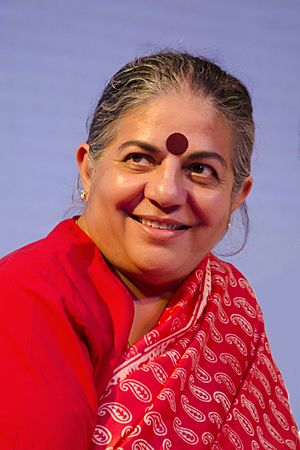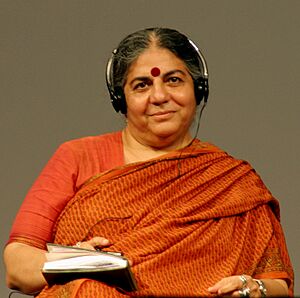Vandana Shiva facts for kids
Quick facts for kids
Vandana Shiva
|
|
|---|---|

Shiva in 2014
|
|
| Born | 5 November 1952 |
| Alma mater | Panjab University, Chandigarh University of Guelph University of Western Ontario |
| Occupation | Philosopher, environmentalist, author, professional speaker, social activist, physicist |
| Awards | Right Livelihood Award (1993) Sydney Peace Prize (2010) Mirodi Prize (2016) Fukuoka Asian Culture Prize (2012) |
Vandana Shiva (born 5 November 1952) is an Indian scholar and environmental activist. She is known for her work on food sovereignty, which means people having control over their own food systems. She is also an ecofeminist and writes about anti-globalization, which is against the idea of countries becoming too connected through trade and culture.
Based in Delhi, India, Shiva has written more than 20 books. People sometimes call her the "Gandhi of grain" because of her work against genetically modified organisms (GMOs). GMOs are plants or animals that have had their genes changed in a lab.
Vandana Shiva is a leader in the anti-globalization movement. She believes in using many traditional farming methods. She is also part of important groups like the International Forum on Globalization.
Contents
Early Life and Education

Vandana Shiva was born in Dehradun, India. Her father worked to protect forests, and her mother was a farmer who loved nature. She went to school in Nainital and Dehradun.
Shiva studied physics at Punjab University in Chandigarh, getting her first degree in 1972. She then moved to Canada to study the philosophy of science at the University of Guelph. In 1978, she earned her PhD in philosophy from the University of Western Ontario. Her studies focused on the philosophy of physics. Later, she did more research on science, technology, and environmental policy in India.
Career and Activism
Vandana Shiva has written and spoken a lot about farming and food. She has worked on topics like intellectual property rights (who owns ideas), biodiversity (the variety of life on Earth), biotechnology (using living things to make products), and genetic engineering.
In 1982, she started the Research Foundation for Science, Technology and Ecology. This led to the creation of Navdanya in 1991. Navdanya is a group that works to protect different kinds of seeds and promote organic farming and fair trade. Navdanya means "Nine Seeds" or "New Gift." It teaches farmers about the benefits of growing many different crops instead of just one type. This group has set up over 40 seed banks across India. These banks help farmers keep a variety of seeds. In 2004, Shiva also started Bija Vidyapeeth, a college for sustainable living in India.
Shiva and her team have challenged what they call "biopiracy." This is when companies try to patent traditional knowledge or plants that have been used by local communities for a long time. For example, they fought against patents on neem, basmati rice, and wheat.
In 1990, she wrote a report for the FAO (Food and Agriculture Organization of the United Nations) about women and farming in India. She also helped start a gender unit at the International Centre for Mountain Development and was a founding member of the Women's Environment & Development Organization.
She received the Right Livelihood Award in 1993. This award honors people who offer practical and important solutions to the world's problems.
Shiva's book Making Peace With the Earth talks about how important biodiversity is and how communities connect with nature. She believes that destroying nature also harms traditional communities.
Vandana Shiva has also advised governments and other organizations. She is part of the Commission on the Future of Food in Italy and is a member of the World Future Council. She also serves on Indian government committees that focus on organic farming.
In 2021, she advised the government of Sri Lanka to stop using chemical fertilizers and pesticides. She believed this would help farmers and the land. However, this sudden change caused problems for farming in Sri Lanka, leading to less tea and rice being grown. The ban was later reversed.
Focus on Agriculture and Seeds
Vandana Shiva's work on farming began in 1984. She argues that the "Green Revolution," which brought new seeds and chemicals, has harmed fertile soil and natural ecosystems. She believes that many pesticides can enter our food.
Shiva supports "seed freedom." This means she is against companies getting patents on new plant types. She believes that patents on living things can harm farmers and biodiversity. She has campaigned against international agreements that allow such patents. She calls the patenting of life "biopiracy."
She has fought against attempts to patent traditional plants like basmati rice and neem. For example, in 2005, her organization won a long battle against a patent on neem by a US company. In 2001, after much effort, a US company lost most of its claims to a patent on basmati rice.
Golden Rice Debate
Vandana Shiva is against golden rice. This is a type of rice that has been changed to produce beta-carotene, which the body turns into Vitamin A. Shiva believes that golden rice is not helpful and might even be harmful. She calls it a "hoax" and says it's more about public relations than real science. She argues that women in Bengal already grow many green vegetables that provide Vitamin A.
Others, like Adrian Dubock, say that golden rice is affordable and that Vitamin A deficiency causes blindness and deaths in many children worldwide. Economists Wesseler and Zilberman calculated in 2013 that not using golden rice in India might have led to over 1.4 million deaths in the previous ten years.
Ecofeminism
Shiva is a key figure in the global ecofeminist movement. Ecofeminism connects the idea of protecting the environment with women's rights. In her 2004 article Empowering Women, she suggests that farming in India would be better if it focused more on women. She believes that environmental problems often become women's responsibility.
In 1993, Shiva co-wrote the book Ecofeminism with Maria Mies. This book combined ideas from Western and Southern feminism with environmental and technological issues.
Science and Knowledge
Vandana Shiva has often described modern science as a "patriarchal project." She believes that the way science has developed, especially since thinkers like Francis Bacon and René Descartes, has led to treating nature as something to be controlled and exploited. She argues that this kind of science ignores older ways of knowing and understanding nature, including the knowledge of indigenous communities and women. She connects the rise of this "mechanistic" science with the growth of capitalism.
Films Featuring Vandana Shiva
Vandana Shiva has appeared in many documentary films. These films often cover topics like food, the environment, and social justice.
Some of the films she has been interviewed for include:
- The Corporation (2003)
- Dirt! The Movie
- Blue Gold: World Water Wars
- Flow: For Love of Water
- The World According to Monsanto
- Queen of the Sun (about honeybees)
- Demain (French for "Tomorrow")
- H.O.P.E.: What You Eat Matters (about animal agriculture)
- Poverty Inc. (2014)
- The True Cost (2015, about fast fashion)
- Planet of the Humans (2018)
Recognition
In 2019, Vandana Shiva was recognized as one of the BBC's 100 women. This list highlights inspiring and influential women from around the world.
See also
 In Spanish: Vandana Shiva para niños
In Spanish: Vandana Shiva para niños
- Green Revolution in India
- Science and technology studies in India
- List of Indian writers

